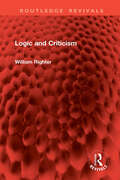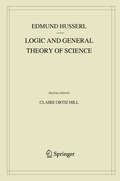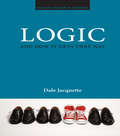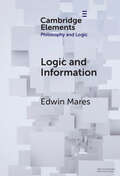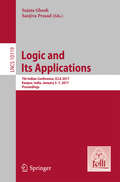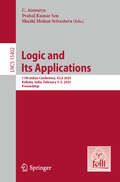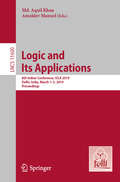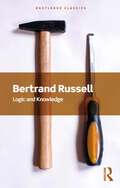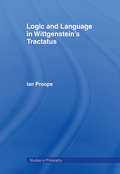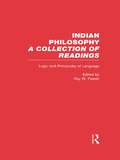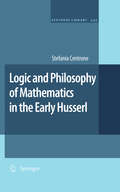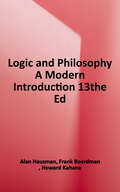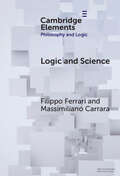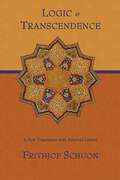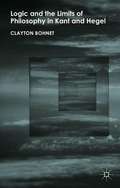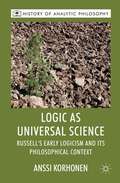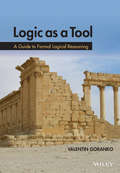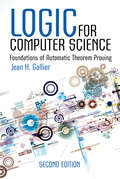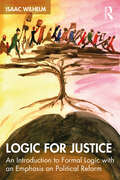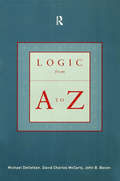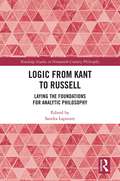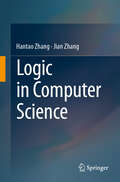- Table View
- List View
Logic and Algebraic Structures in Quantum Computing
by Jennifer Chubb Ali Eskandarian Valentina HarizanovArising from a special session held at the 2010 North American Annual Meeting of the Association for Symbolic Logic, this volume is an international cross-disciplinary collaboration with contributions from leading experts exploring connections across their respective fields. <P><P>Themes range from philosophical examination of the foundations of physics and quantum logic, to exploitations of the methods and structures of operator theory, category theory, and knot theory in an effort to gain insight into the fundamental questions in quantum theory and logic. The book will appeal to researchers and students working in related fields, including logicians, mathematicians, computer scientists, and physicists. A brief introduction provides essential background on quantum mechanics and category theory, which, together with a thematic selection of articles, may also serve as the basic material for a graduate course or seminar.
Logic and Criticism (Routledge Revivals)
by William RighterFirst Published in 1963, Logic and Criticism makes one of the rare attempts since that of I.A. Richard’s Principles of Literary Criticism to examine the problems of criticism in the light of recent philosophical developments. The character of critical language and argument, the problem of judgement, the relevance or irrelevance of moral criteria, are considered in detail through examples drawn from the most important modern critics. Above all the work is concerned with the question of how logical or illogical an activity criticism is, and the conclusions drawn have great relevance to current critical discussion. This is a must read for scholars and researchers of philosophy and literature.
Logic and General Theory of Science (Husserliana: Edmund Husserl – Collected Works #15)
by Edmund HusserlThe stated subject of these lecture courses given by Husserlbetween 1910 and 1918is ‘reason, the word for the mental activities and accomplishments that govern knowledge, give it form and supply it with norms.’They show their author still pursuing the course set out in the Logical Investigations up to the end of the second decade of the century and displaying utter consistency with stands that he began taking on meaning, analyticity, Platonism, manifolds, mathematics, psychologism, etc. in the 1890s. Thus, they undermine many idées reçues about the development of his thought. The centerpiece of this work is an exploration of the realm of meaning.Moreover, they add new dimensions to standard discussions by taking readers back to the place where phenomenology and analytic philosophy diverged. They show that Husserl tangled long and hard with the very ideas that went into the making of the latter and offer a wealth of interesting insights into sense and meaning, theory of judgment, complete and incomplete meanings, states of affairs, extensional logic, the relationship between logic and mathematics, functions and arguments, propositional functions, quantification, existential generalization, the word ‘all,’ number theory, sets, modality, deductive theory, ideas that are still under discussion today.Prepared for oral delivery in the classroom, they are refreshingly lively and spontaneous. They are clearer, more explicit, and readable than the books Husserl published during his lifetime.
Logic and How it Gets That Way (Acumen Research Editions Ser.)
by Dale JacquetteIn this challenging and provocative analysis, Dale Jacquette argues that contemporary philosophy labours under a number of historically inherited delusions about the nature of logic and the philosophical significance of certain formal properties of specific types of logical constructions. Exposing some of the key misconceptions about formal symbolic logic and its relation to thought, language and the world, Jacquette clears the ground of some very well-entrenched philosophical doctrines about the nature of logic, including some of the most fundamental seldom-questioned parts of elementary propositional and predicate-quantificational logic. Having presented difficulties for conventional ways of thinking about truth functionality, the metaphysics of reference and predication, the role of a concept of truth in a theory of meaning, among others, Jacquette proceeds to reshape the network of ideas about traditional logic that philosophy has acquired along with modern logic itself. In so doing Jacquette is able to offer a new perspective on a number of existing problems in logic and philosophy of logic.
Logic and Information (Elements in Philosophy and Logic)
by Edwin MaresThis Element looks at two projects that relate logic and information: the project of using logic to integrate, manipulate and interpret information and the proect of using the notion of information to provide interpretations of logical systems. The Element defines 'information' in a manner that includes misinformation and disinformation and uses this general concept of information to provide an interpretation of various paraconsistent and relevant logics. It also integrates these logics into contemporary theories of informational updating, probability theory and (rather informally) some ideas from the theory of the complexity of proofs. The Element assumes some prior knowledge of modal logic and its possible world semantics, but all the other necessary background is provided.
Logic and Its Applications
by Sanjiva Prasad Sujata GhoshThis book collects the refereed proceedings of the 7th Indian Conference on Logic and Its Applications, ICLA 2017, held in Mumbai, India, in January 2017. The volume contains 13 full revised papers along with 4 invited talks presented at the conference. The aim of this conference series is to bring together researchers from a wide variety of fields in which formal logic plays a significant role. Areas of interest include mathematical and philosophical logic, computer science logic, foundations and philosophy of mathematics and the sciences, use of formal logic in areas of theoretical computer science and artificial intelligence, logic and linguistics, and the relationship between logic and other branches of knowledge. Of special interest are studies in systems of logic in the Indian tradition, and historical research on logic.
Logic and Its Applications: 11th Indian Conference, ICLA 2025, Kolkata, India, February 3–5, 2025, Proceedings (Lecture Notes in Computer Science #15402)
by Shashi Mohan Srivastava C. Aiswarya Prabal Kumar SenThis book constitutes the refereed proceedings of the 11th Indian Conference on Logic and Its Applications, ICLA 2025, held in Kolkata, India, during February 3–5, 2025. Four out the five invited talks are included in this book. Out of the 26 submissions, the program committee carefully selected 14 papers to be included in the proceedings. The topics included are Mathematics, Computer Science, Philosophy, Linguistics and Cognitive Science. A special feature of ICLA is the inclusion of studies in systems of logic in the Indian tradition, as well as historical research on logic.
Logic and Its Applications: 8th Indian Conference, ICLA 2019, Delhi, India, March 1-5, 2019, Proceedings (Lecture Notes in Computer Science #11600)
by Md. Aquil Khan Amaldev ManuelThis book collects the refereed proceedings of the 8th Indian Conference on Logic and Its Applications, ICLA 2019, held in Delhi, India, in March 2019. The volume contains 13 full revised papers along with 6 invited talks presented at the conference. The aim of this conference series is to bring together researchers from a wide variety of fields in which formal logic plays a significant role. Areas of interest include mathematical and philosophical logic, computer science logic, foundations and philosophy of mathematics and the sciences, use of formal logic in areas of theoretical computer science and artificial intelligence, logic and linguistics, and the relationship between logic and other branches of knowledge. Of special interest are studies in systems of logic in the Indian tradition, and historical research on logic.
Logic and Knowledge (Routledge Classics)
by Bertrand RussellBertrand Russell's writings on logic, metaphysics, philosophy of language and epistemology are among the most influential of the twentieth century. Logic and Knowledge presents Russell's very best and most important work on these topics in a single volume, which by placing philosophical logic at its core was of monumental importance in shaping the path of analytical philosophy. It includes classics such as 'On Denoting', one of the founding pieces of philosophy of the twentieth century as well as chapters on logical atomism, a term coined by Russell himself to describe his view that the world consists in a plurality of independent entities, which by coming together form facts.Along with other essays on fundamental philosophical problems including the logic of relations, universals and particulars, and propositions, Logic and Knowledge shows why Russell remains one of the most important philosophers of the last century.This Routledge Classics edition includes a new Foreword by Graham Stevens.
Logic and Language in Wittgenstein's Tractatus (Dissertations In Philosophy Ser.)
by Ian ProopsThis historical study investigates Ludwig Wittgenstein's early philosophy of logic and language, as it is presented in his Tractatus Logico-Philosophicus. The study makes a case for the Tractatus as an insightful critique of the philosophies of Bertrand Russell and Gottlob Frege-the Founding Fathers of analytic philosophy.
Logic and Language: Indian Philosophy (Problems Of Philosophy Ser. #Vol. 2)
by Roy PerrettFirst published in 2001. Routledge is an imprint of Taylor & Francis, an informa company.
Logic and Philosophy of Mathematics in the Early Husserl
by Stefania CentroneLogic and Philosophy of Mathematics in the Early Husserl focuses on the first ten years of Edmund Husserl's work, from the publication of his Philosophy of Arithmetic (1891) to that of his Logical Investigations (1900/01), and aims to precisely locate his early work in the fields of logic, philosophy of logic and philosophy of mathematics. Unlike most phenomenologists, the author refrains from reading Husserl's early work as a more or less immature sketch of claims consolidated only in his later phenomenology, and unlike the majority of historians of logic she emphasizes the systematic strength and the originality of Husserl's logico-mathematical work. The book attempts to reconstruct the discussion between Husserl and those philosophers and mathematicians who contributed to new developments in logic, such as Leibniz, Bolzano, the logical algebraists (especially Boole and Schröder), Frege, and Hilbert and his school. It presents both a comprehensive critical examination of some of the major works produced by Husserl and his antagonists in the last decade of the 19th century and a formal reconstruction of many texts from Husserl's Nachlaß that have not yet been the object of systematical scrutiny. This volume will be of particular interest to researchers working in the history, and in the philosophy, of logic and mathematics, and more generally, to analytical philosophers and phenomenologists with a background in standard logic.
Logic and Philosophy of Mathematics in the Early Husserl (Synthese Library #345)
by Stefania CentroneLogic and Philosophy of Mathematics in the Early Husserl focuses on the first ten years of Edmund Husserl’s work, from the publication of his Philosophy of Arithmetic (1891) to that of his Logical Investigations (1900/01), and aims to precisely locate his early work in the fields of logic, philosophy of logic and philosophy of mathematics. Unlike most phenomenologists, the author refrains from reading Husserl’s early work as a more or less immature sketch of claims consolidated only in his later phenomenology, and unlike the majority of historians of logic she emphasizes the systematic strength and the originality of Husserl’s logico-mathematical work. The book attempts to reconstruct the discussion between Husserl and those philosophers and mathematicians who contributed to new developments in logic, such as Leibniz, Bolzano, the logical algebraists (especially Boole and Schröder), Frege, and Hilbert and his school. It presents both a comprehensive critical examination of some of the major works produced by Husserl and his antagonists in the last decade of the 19th century and a formal reconstruction of many texts from Husserl’s Nachlaß that have not yet been the object of systematical scrutiny. This volume will be of particular interest to researchers working in the history, and in the philosophy, of logic and mathematics, and more generally, to analytical philosophers and phenomenologists with a background in standard logic.
Logic and Philosophy: A Modern Introduction
by Alan Hausman Frank Boardman Howard KahaneA comprehensive introduction to formal logic, this is a rigorous yet accessible text, appropriate for students encountering the subject for the first time. Great, carefully crafted exercise sets accompanied by a straightforward, engaging exposition built to an exploration of sentential logic, first-order predicate logic, the theory of descriptions, identity, relations, set theory, modal logic, and Aristotelian logic. And as its title suggests, Logic and Philosophy are devoted not only to logic but also to the philosophical debates that led to the development of the field. <p><p>Much new material has been added for the 13th edition. An introduction to set theory and its relationship to logic and mathematics, including philosophical issues, is now part of Chapter 13. Chapter 15 is an introduction to modal logic and Kripke semantics, concluding with a discussion of philosophical problems with any logical accommodation of modalities. Instructors who do not wish to present proof methods will find chapters on truth trees for both sentential and first-order logic and a presentation of trees for modal logic. <p><p>Special features of this text include presentations of the history of logic, alternatives to traditional methods of conditional and indirect proof, and a discussion of semantic problems with universal and existential instantiations. Throughout, the authors are sensitive to philosophical issues that arise from the relationship between ordinary language, symbolic logic, and justifications for the syntax and semantics of the various symbolic languages. Discussions range from the justification of the truth table for the sentential rendering of if . . . then statements to semantic and syntactic paradoxes, including some troubling contradictions that arise in ordinary language (e.g., the so-called hangman or surprise quiz paradox). <p><p>Logic and Philosophy includes ample material for a one-semester or two-semester course and provides a thorough preparation for more advanced logic courses.
Logic and Science: An Exploration of Logical Anti-Exceptionalism (Elements in Philosophy and Logic)
by Massimiliano Carrara Filippo FerrariThis Element delves into the relationship between logic and the sciences, a topic brought to prominence by Quine, who regarded logic as methodologically and epistemologically akin to the sciences. For this reason, Quine is seen as the forefather of anti-exceptionalism about logic (AEL), a stance that has become prevalent in the philosophy of logic today. Despite its popularity and the volume of research it inspires, some core issues still lack clarity. For one thing, most works in the debate remain vague on what should count as logic and what should count as a science. Furthermore, the terms of the comparison are rarely specified and discussed in a systematic way. This Element purports to advance the debate on these crucial issues with the hope of fostering our understanding of the fundamentals of AEL. This title is also available as Open Access on Cambridge Core.
Logic and Transcendence: A New Translation with Selected Letters
by Frithjof SchuonIn this new edition of his most important philosophical work, Frithjof Schuon confronts the pitfalls of rationalism and relativism within modern philosophy. This new edition comprises a fully revised translation from the French original and contains an extensive Appendix with previously unpublished letters and other private writings.
Logic and the Limits of Philosophy in Kant and Hegel
by Clayton BohnetThis text examines the boundary between philosophy and formal logic in Kant and Hegel. It takes up the particular category of 'quantity' as a point around which to explore Kant's and Hegel's larger architectonic concerns. Analysis of the relation in Kant between quantity in formal logic and in his transcendental logic reveals two complementary but distinct approaches that preserve the boundary between philosophy and formal logic. By contrast, in Hegel's Science of Logic we find both a novelapproach to the traditional treatment of quantity in logic, and a reconstruction of the relation of logic to all other determinations of thought. By basing its examination of the relation of formal logic and philosophy in Kant and Hegel on a detailed analysis of quantity, Logic and the Limits of Philosophy in Kant and Hegel provides a resource for an historically informed interpretation of the revolutions in logic that marked the onset of our digital age.
Logic as Universal Science
by Anssi KorhonenLogic as Universal Science offers a detailed reconstruction of the underlying philosophy in The Principles of Mathematics showing how Russell sought to deliver a death blow to the dominant Kantian view that formal logic is a concise and dry science and unable to enlarge our understanding.
Logic as a Tool: A Guide to Formal Logical Reasoning (Wiley Desktop Editions Ser.)
by Valentin GorankoWritten in a clear, precise and user-friendly style, Logic as a Tool: A Guide to Formal Logical Reasoning is intended for undergraduates in both mathematics and computer science, and will guide them to learn, understand and master the use of classical logic as a tool for doing correct reasoning. It offers a systematic and precise exposition of classical logic with many examples and exercises, and only the necessary minimum of theory. The book explains the grammar, semantics and use of classical logical languages and teaches the reader how grasp the meaning and translate them to and from natural language. It illustrates with extensive examples the use of the most popular deductive systems -- axiomatic systems, semantic tableaux, natural deduction, and resolution -- for formalising and automating logical reasoning both on propositional and on first-order level, and provides the reader with technical skills needed for practical derivations in them. Systematic guidelines are offered on how to perform logically correct and well-structured reasoning using these deductive systems and the reasoning techniques that they employ. •Concise and systematic exposition, with semi-formal but rigorous treatment of the minimum necessary theory, amply illustrated with examples •Emphasis both on conceptual understanding and on developing practical skills •Solid and balanced coverage of syntactic, semantic, and deductive aspects of logic •Includes extensive sets of exercises, many of them provided with solutions or answers•Supplemented by a website including detailed slides, additional exercises and solutionsFor more information browse the book's website at: https://logicasatool.wordpress.com
Logic for Computer Science: Foundations of Automatic Theorem Proving, Second Edition (Dover Books on Computer Science)
by Jean H. GallierThis advanced text for undergraduate and graduate students introduces mathematical logic with an emphasis on proof theory and procedures for algorithmic construction of formal proofs. The self-contained treatment is also useful for computer scientists and mathematically inclined readers interested in the formalization of proofs and basics of automatic theorem proving. Topics include propositional logic and its resolution, first-order logic, Gentzen's cut elimination theorem and applications, and Gentzen's sharpened Hauptsatz and Herbrand's theorem. Additional subjects include resolution in first-order logic; SLD-resolution, logic programming, and the foundations of PROLOG; and many-sorted first-order logic. Numerous problems appear throughout the book, and two Appendixes provide practical background information.
Logic for Justice: An Introduction to Formal Logic with an Emphasis on Political Reform
by Isaac WilhelmAn introductory textbook, Logic for Justice covers, in full detail, the language and semantics of both propositional logic and first-order logic. It motivates the study of those logical systems by drawing on social and political issues. Basically, Logic for Justice frames propositional logic and first-order logic as two theories of the distinction between good arguments and bad arguments. And the book explains why, for the purposes of social justice and political reform, we need theories of that distinction. In addition, Logic for Justice is extremely lucid, thorough, and clear. It explains, and motivates, many different features of the formalism of propositional logic and first-order logic, always connecting those features back to real-world issues. Key Features Connects the study of logic to real-world social and political issues, drawing in students who might not otherwise be attracted to the subject. Offers extremely clear and thorough presentations of technical material, allowing students to learn directly from the book without having to rely on instructor explanations. Carefully explains the value of arguing well throughout one’s life, with several discussions about how to argue and how arguments – when done with care – can be helpful personally. Includes examples that appear throughout the entire book, allowing students to see how the ideas presented in the book build on each other. Provides a large and diverse set of problems for each chapter. Teaches logic by connecting formal languages to natural languages with which students are already familiar, making it much easier for students to learn how logic works.
Logic from A to Z: The Routledge Encyclopedia of Philosophy Glossary of Logical and Mathematical Terms
by John B. Bacon Michael Detlefsen David Charles McCartyFirst published in the most ambitious international philosophy project for a generation; the Routledge Encyclopedia of Philosophy.Logic from A to Z is a unique glossary of terms used in formal logic and the philosophy of mathematics.Over 500 entries include key terms found in the study of:* Logic: Argument, Turing Machine, Variable* Set and model theory: Isomorphism, Function* Computability theory: Algorithm, Turing Machine* Plus a table of logical symbols.Extensively cross-referenced to help comprehension and add detail, Logic from A to Z provides an indispensable reference source for students of all branches of logic.
Logic from Kant to Russell: Laying the Foundations for Analytic Philosophy (Routledge Studies in Nineteenth-Century Philosophy)
by Sandra LapointeThe scope and method of logic as we know it today eminently reflect the ground-breaking developments of set theory and the logical foundations of mathematics at the turn of the 20th century. Unfortunately, little effort has been made to understand the idiosyncrasies of the philosophical context that led to these tremendous innovations in the 19thcentury beyond what is found in the works of mathematicians such as Frege, Hilbert, and Russell. This constitutes a monumental gap in our understanding of the central influences that shaped 19th-century thought, from Kant to Russell, and that helped to create the conditions in which analytic philosophy could emerge. The aim of Logic from Kant to Russell is to document the development of logic in the works of 19th-century philosophers. It contains thirteen original essays written by authors from a broad range of backgrounds—intellectual historians, historians of idealism, philosophers of science, and historians of logic and analytic philosophy. These essays question the standard narratives of analytic philosophy’s past and address concerns that are relevant to the contemporary philosophical study of language, mind, and cognition. The book covers a broad range of influential thinkers in 19th-century philosophy and analytic philosophy, including Kant, Bolzano, Hegel, Herbart, Lotze, the British Algebraists and Idealists, Moore, Russell, the Neo-Kantians, and Frege.
Logic in Computer Science
by Jian Zhang Hantao ZhangMathematical logic is an important basis for mathematics, computer science and artificial intelligence alike. This book provides a comprehensive introduction to various logics, including classical propositional logic and first-order predicate logic, as well as equational logic, temporal logic, and Hoare logic. In addition, it presents proof procedures for classical logics and decision procedures for checking the satisfiability of logical formulas. The book assumes no background in logic. It presents logics as practical tools for solving various problems in artificial intelligence and formal verification. Accordingly, it is well suited for (junior and senior) undergraduate and graduate students majoring in computer science or mathematics. Each chapter includes roughly a dozen exercise problems, so as to help the reader understand the concepts and techniques discussed.
Logic in Computer Science: Modelling and Reasoning about Systems
by Mark Ryan Michael HuthIn recent years, powerful tools for verifying hardware and software systems have been developed. Major companies, such as Intel, Siemens, BT, AT & T, and IBM have increasingly become interested in that technology. Students need a basic formal training that allows them to gain sufficient proficiency in using logic-based verification methods. This book addresses these needs by providing a sound basis in logic and an introduction to the logical frameworks used in modeling, specifying and verifying computer systems. Coverage provides a simple and clear presentation, detailing propositional and predicate logic as well as some specialized logics used for reasoning about the correctness of computer systems. The authors introduce a carefully chosen core of essential terminology; further technicalities are introduced only where they are required by the applications. Numerous examples are given, as well as a full exposition of a fast-growing technique for modeling and verifying computer systems, known as symbolic model checking. It will be an ideal introduction for undergraduate students. A worldwide web tutorial that supports the course activities and provides solutions to the sample exercises is available to instructors.

